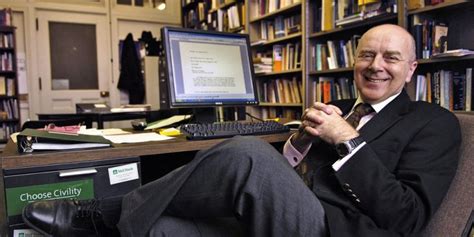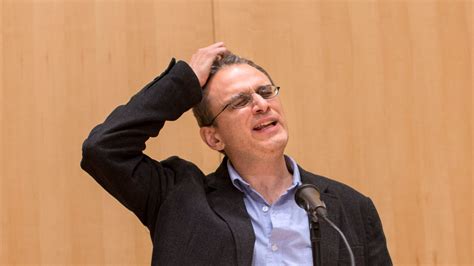A Quote by Charles Koch
How do we have a society that maximizes peace, civility and well-being for everyone? How do we have a system of individual rights in which people succeed by helping others improve their lives? We're a long way from that. So what, I mean, we got more to learn than we know, to me. So we need better ideas.
Related Quotes
I don't like the idea of capitalism anyway. Because it's not capital we are talking about; it's knowledge and creating well-being. Because I mean, that gets people on the wrong track when it's capital and how we allocate capital - no. How do we create the Republic of Science in America? How do we have a system of mutual benefits where people succeed by helping others improve their lives? So I don't like that at all.
Civility means a great deal more than just being nice to one another. It is complex and encompasses learning how to connect successfully and live well with others, developing thoughtfulness, and fostering effective self-expression and communication. Civility includes courtesy, politeness, mutual respect, fairness, good manners, as well as a matter of good health. Taking an active interest in the well-being of our community and concern for the health of our society is also involved in civility.
We have to think and see how we can fundamentally change our education system so that we can train people to develop warm-heartedness early on in order to create a healthier society. I don't mean we need to change the whole system, just improve it. We need to encourage an understanding that inner peace comes from relying on human values like, love, compassion, tolerance and honesty, and that peace in the world relies on individuals finding inner peace.
The players start to recognise your game, start to know how you move, how you pass, how you shoot and the things become difficult now. So now I need to improve more and to work more and understand more the teams who I play against because they will understand me better, but I need to be prepared to understand better the difficulties they can have.
The saying goes that history repeats itself; personal histories do the same. We can gather the lessons of others' lives through observation, conversation, and by seeking advice. We can use the automatic system to find out who the happy people are, and the reflective system to evaluate how they got to be that way. Pursuing happiness need not be a lonely endeavor. In fact, throwing in our lot with others may be a very good way of coping with the disappointments of choice.
A truly free society must not include a peace which oppresses us. We must learn on our own terms what peace and freedom mean together. There can be no peace if there is social injustice and suppression of human rights, because external and internal peace are inseparable. Peace is not just the absence of mass destruction, but a positive internal and external condition in which people are free so that they can grow to their full potential.
There's no doubt about it: fun people are fun. But I finally learned that there is something more important, in the people you know, than whether they are fun. Thinking about those friends who had given me so much pleasure but who had also caused me so much pain, thinking about that bright, cruel world to which they'd introduced me, I saw that there's a better way to value people. Not as fun or not fun, or stylish or not stylish, but as warm or cold, generous or selfish. People who think about others and people who don't. People who know how to listen, and people who only know how to talk.
It is not nearly so important how well a message is received as how well it is sent. You cannot take responsibility for how well another accepts your truth; you can only ensure how well it is communicated. And by how well, I don't mean merely how clearly; I mean how lovingly, how compassionately, how sensitively, how courageously, and how completely.
































